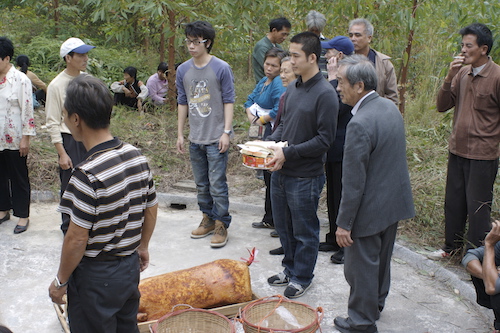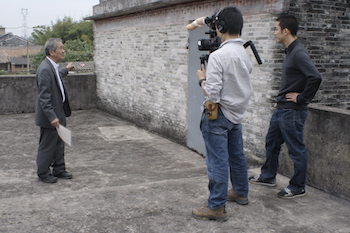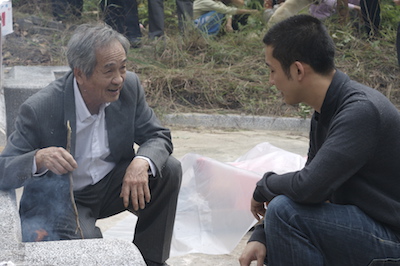Arpa Film Festival 2015 interviews with film directors
Kenneth Eng has dedicated his life to making documentary films, “which feature extraordinary stories of real people that communicate from the heart and inspire others.” His film, My Life in China, is a 2015 Arpa International Film Festival Best Documentary nominee. Making his documentary has had a resounding impact on him, gaining a deeper connection to his father and engendering profound self-awareness that has him saying, “I found myself.” Eng’s documentary retraces his father’s epic journey to America in search of a better life.
Soon after graduating from high school in Boston, Eng left for New York City in 1994 to study film at the School of Visual Arts. Since then, some of his documentaries and shorts have been televised on PBS, with Kokoyakyu: High School Baseball, a film about the famous Koshien Tournament in Japan, being nationally broadcast as part of PBS’s prestigious documentary showcase, POV. In 2007, Eng was awarded the Guggenheim Fellowship and received $50,000 to launch My Life In China. With that small budget, He made it work and flew with his father and a small crew to China, where he shot 95 percent of his film. The editing process took much longer, as he worked multiple gigs to raise enough funds to complete it and then promote the film to festivals. Last year, Eng won the San Diego Asian Film Festival Best Feature Documentary award. He is hoping to nab this year’s Arpa Film Festival Best Documentary award too.
The 18th Annual Arpa International Film Festival will screen My Life in China at noon, on November 15, at the Egyptian Theatre in Hollywood. Sharon Swainson, writer for Arpa Film Festival, interviewed Eng with the below six questions. His answers are as follows:
Why did you choose to make your film?
 My Life in China is possible because of the Guggenheim Fellowship that I received. This really freed me up to be creative. As a career freelancer, it’s such a privilege to be able to make a film that means so much to me and have it be something I can call my own. Growing up in Boston, I was always embarrassed about who I was. I didn’t understand what it meant to be Chinese-American. It was through the making of the film that I finally found myself.
My Life in China is possible because of the Guggenheim Fellowship that I received. This really freed me up to be creative. As a career freelancer, it’s such a privilege to be able to make a film that means so much to me and have it be something I can call my own. Growing up in Boston, I was always embarrassed about who I was. I didn’t understand what it meant to be Chinese-American. It was through the making of the film that I finally found myself.
I wanted to honor my parents while they were still alive and let them know that I finally understood their sacrifice. I wanted to make a documentary film that was personal, but at the same time brings attention to other people with similar experiences. This film was based on the perspective that we can inspire others by looking at ourselves.
The film’s goal is to build compassion and understanding for the immigrant experience. There’s still large groups of people migrating and risking their lives for a better life. The least we can do as a society is to try to understand them better.
Name a moment during shooting that made you proud.
One of the proudest moments during the shooting of the film takes place when I interview my father in the old house in the village. It’s the moment I finally realize his sacrifice was for me. True story.
Was there a moment that became a creative breakthrough while making your film?
Throughout the shooting of the film, I’m trying my best to avoid being in the film. It wasn’t until we were on the roof where our cameraman pans over to me as I’m having my emotional realization — then I finally embraced being in the film. This is when I realized I needed to take advantage of the distinct POV in the storytelling -if I can put the viewer in my shoes, perhaps they can feel what I feel when the revelation happens.
During the creative process, was there a moment when you let go of certainties and just ran with it, allowing creativity to do its thing?
My Life In China was originally a collection of four stories of migrations. My father’s story was just one of them. We tried to shoot and produce the other three stories, but it was very obvious we had everything we needed with my father. Our fallback plan became the main plan!
 Since an artist is truly never finished, is there anything that you would like to do differently or add to your film?
Since an artist is truly never finished, is there anything that you would like to do differently or add to your film?
Given the circumstance and budget, I don’t know if I could have done it any other way. I probably should have cancelled the other three stories and just stayed with my father. In a perfect world, it wouldn’t take eight years to make and there would be enough money to finish it in a timely manner. Also, I would wait until the film was finally finished before sending to all the different distribution channels — I think it slowed us down if anything.
What does it mean to you to have your film selected by the Arpa International Film Festival?
It’s a real honor to be a part of the Arpa International Film Festival, considering their mission and what the festival is all about. It’s an incredible feeling to be able to come such a long way and be recognized for something I believe in so strongly. This recognition will help us build more momentum as we get this independent film out to the world!!
 Written by Sharon Swainson
Written by Sharon Swainson
Communications & Content Development
2015 Arpa International Film Festival

